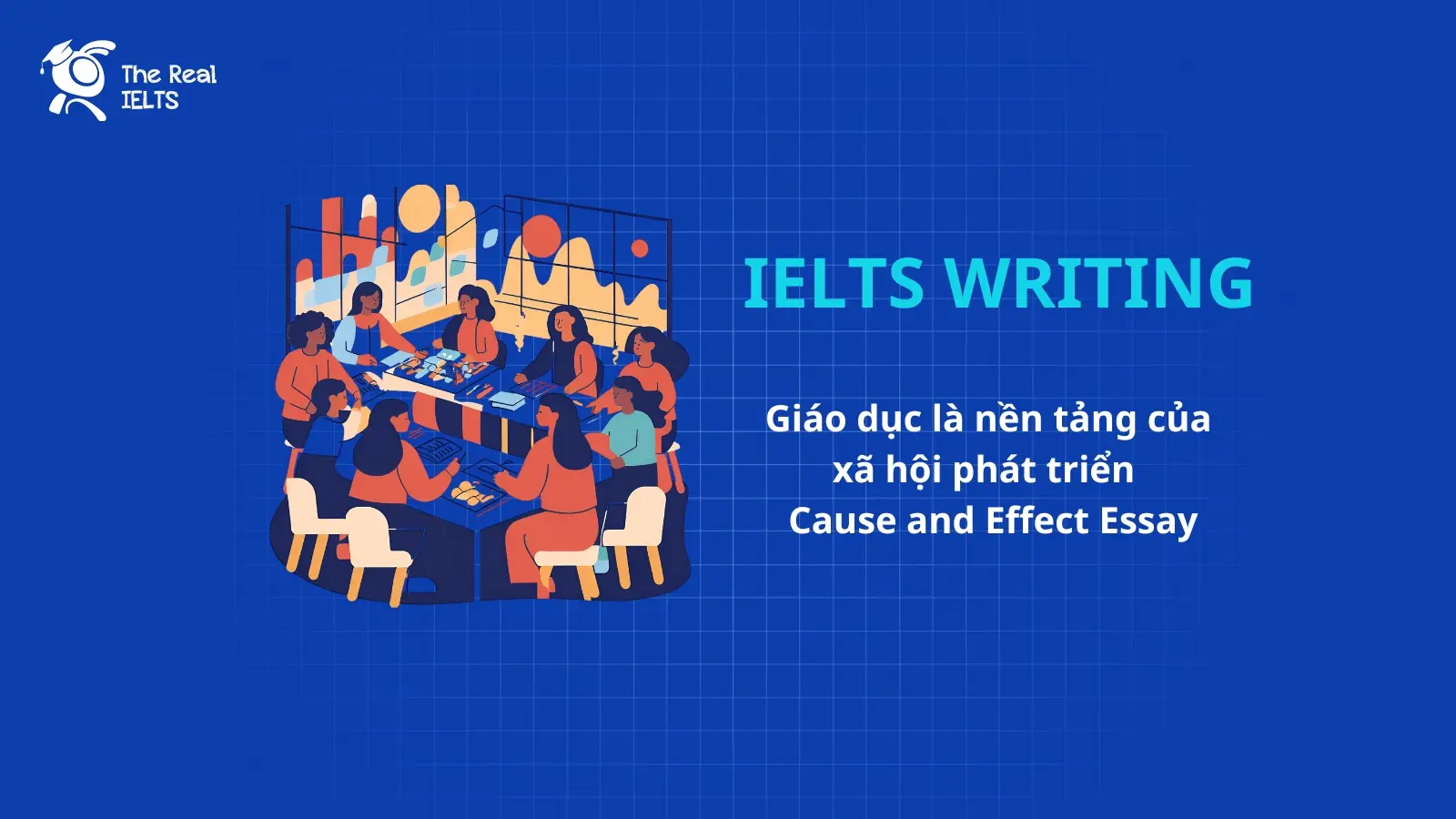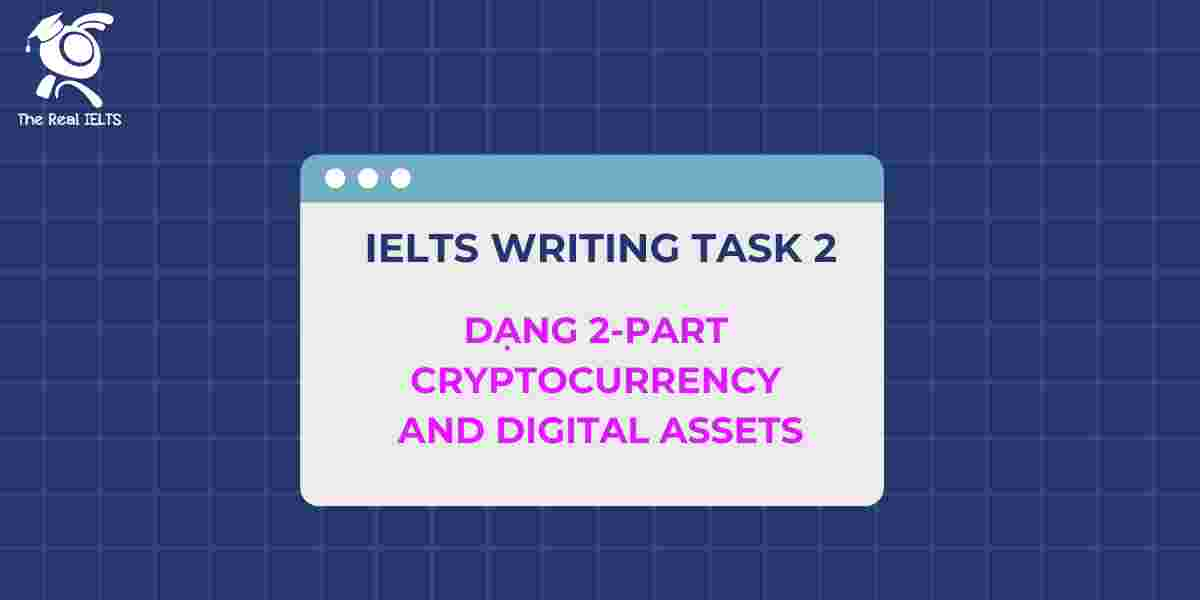Nâng cao band điểm IELTS Writing Task 2 dạng Cause & Effect Essay với chủ đề “Giáo dục: Nguyên nhân và kết quả của sự phát triển xã hội”. Khám phá cách phân tích nguyên nhân, hậu quả, từ vựng học thuật và bài mẫu chất lượng.
Đọc thêm: IELTS Writing Task 2: Giáo dục là nền tảng của xã hội phát triển – Problem and Solution Essay
Đề bài IELTS Writing Task 2: Giáo dục là nền tảng của xã hội phát triển – Cause and Effect Essay
Câu trả lời 1
A well-educated population is widely associated with a developed society, as education plays a fundamental role in economic, social, and political progress. This essay will explore the reasons behind this correlation and discuss its effects on a country’s growth.
Causes of the Correlation Between Education and Development
One of the main reasons education is linked to societal development is its impact on economic growth. An educated workforce is more skilled, innovative, and productive, leading to higher employment rates and increased national income. Countries with strong education systems tend to attract foreign investments and foster entrepreneurship, which further drives economic progress.
Another key factor is education’s role in social stability and equality. When individuals receive quality education, they gain access to better job opportunities, reducing income inequality and poverty. Additionally, education promotes awareness of human rights, gender equality, and cultural tolerance, leading to a more cohesive and fair society.
Furthermore, education contributes to effective governance and democracy. Educated citizens are more likely to participate in political processes, demand transparency, and make informed decisions. This helps reduce corruption and ensures that governments implement policies that benefit the majority, rather than a select few.
Effects of an Educated Population on a Country’s Growth
A well-educated population brings numerous positive effects to a nation. Firstly, it enhances technological advancements and innovation. Highly educated individuals are more likely to engage in research and development, creating new technologies that improve productivity and overall quality of life. Countries that prioritize education, such as Japan and Germany, have become global leaders in technology and industry.
Secondly, improved education leads to better healthcare outcomes. Educated individuals tend to be more aware of hygiene, nutrition, and disease prevention, resulting in lower mortality rates and higher life expectancy. Additionally, countries with strong education systems produce more skilled healthcare professionals, ensuring better medical services for the population.
Moreover, education fosters environmental awareness and sustainability. People who are well-informed about climate change and environmental issues are more likely to adopt eco-friendly practices and support policies that promote sustainability, which is crucial for long-term development.
Conclusion
In conclusion, the strong correlation between education and societal development is driven by its impact on economic growth, social stability, and governance. The effects of an educated population include technological progress, improved healthcare, and greater environmental awareness, all of which contribute to a nation’s sustainable growth. Therefore, investing in education is essential for any country striving for long-term prosperity and development.
Câu trả lời 2
A strong correlation exists between a well-educated populace and a developed society. This essay will explore the underlying causes of this link and analyze the multifaceted effects of education on a nation’s overall growth.
Causes:
- Prioritization of Education: Societies that prioritize education invest heavily in building robust education systems, ensuring access to quality learning opportunities for all citizens. This commitment stems from a recognition of education’s transformative power.
- Economic Prosperity: A thriving economy enables governments to allocate more resources to education, fostering a positive feedback loop. As the economy grows, further investments in education become possible, leading to a more skilled workforce and continued economic expansion.
- Cultural Value of Education: In many developed societies, education is highly valued and viewed as a pathway to personal and societal advancement. This cultural emphasis on learning encourages individuals to pursue higher education and lifelong learning.
- Political Stability and Good Governance: Stable political systems and effective governance create an environment conducive to educational development. Sound policies and consistent investment in education are more likely in stable and well-governed nations.
- Access to Information and Technology: Ready access to information and technology fosters a culture of learning and innovation. Developed societies often have well-developed information infrastructure and readily available technology, facilitating access to educational resources.
Effects:
- Economic Growth: A well-educated workforce drives economic growth through increased productivity, innovation, and entrepreneurship. Skilled workers are better equipped to adapt to technological advancements and contribute to a competitive economy.
- Social Progress: Education promotes social cohesion, tolerance, and understanding. It empowers citizens to participate actively in democratic processes, demand accountability from their leaders, and contribute to a more just and equitable society.
- Improved Health and Well-being: Education equips individuals with the knowledge and skills to make informed decisions about their health, leading to better health outcomes and a higher quality of life.
- Technological Advancements: A well-educated population is more likely to drive technological innovation and development. Scientific breakthroughs and technological advancements are often spearheaded by highly educated individuals.
- Reduced Poverty and Inequality: Education can help break the cycle of poverty by providing individuals with the skills and knowledge they need to secure better employment opportunities and improve their economic prospects. This, in turn, contributes to reduced inequality.
- Sustainable Development: Education fosters awareness of environmental issues and promotes responsible resource management. Educated citizens are more likely to advocate for sustainable practices and support policies that protect the environment.
In conclusion, the correlation between a well-educated population and a developed society is driven by a combination of factors, including prioritization of education, economic prosperity, and cultural values. The effects of this correlation are far-reaching, impacting economic growth, social progress, technological advancements, and overall well-being. Investing in education is therefore an investment in a nation’s future, paving the way for sustainable and inclusive development.
Câu trả lời 3
A well-educated population is frequently associated with a developed society, as education plays a pivotal role in shaping economic, social, and political progress. This essay will explore the causes of this correlation and examine the effects it has on a country’s growth.
Causes of the correlation between education and a developed society:
One primary cause is that education equips individuals with the skills and knowledge necessary for economic advancement. A well-educated workforce can drive innovation, improve productivity, and adapt to changes in industries. For example, countries like South Korea and Germany have leveraged their strong education systems to establish themselves as leaders in technology and manufacturing, creating robust economies.
Additionally, education fosters social awareness and civic participation. Educated citizens are more likely to understand their rights and responsibilities, leading to greater engagement in democratic processes and community development. This civic consciousness promotes stability, reduces corruption, and encourages the formulation of policies that benefit society as a whole.
Another cause is that education helps to reduce inequality. By providing opportunities for people from all socio-economic backgrounds, education empowers individuals to improve their living standards, thereby narrowing the gap between rich and poor. This inclusivity contributes to social harmony, which is a hallmark of a developed society.
Effects of an educated population on a country’s growth:
The economic impact of an educated population is significant. Educated individuals are better positioned to contribute to high-value industries, attract foreign investments, and create new businesses, all of which stimulate economic growth. For instance, countries with high literacy rates often enjoy higher GDPs and more resilient economies.
Socially, a well-educated population leads to improved quality of life. Education is linked to better healthcare outcomes, lower crime rates, and higher life expectancy. These improvements not only enhance individual well-being but also reduce the burden on public resources, allowing governments to allocate funds more effectively.
Politically, education strengthens governance. Educated citizens are more likely to hold governments accountable and advocate for transparency and fairness. This fosters a stable political environment that attracts investments and supports long-term development.
The correlation between a well-educated population and a developed society is rooted in education’s ability to drive economic progress, promote social equity, and enhance civic participation. The effects of this correlation are transformative, fueling a country’s growth and ensuring sustainable development. Therefore, prioritizing education is essential for any nation aspiring to achieve prosperity and stability.
Câu trả lời 4
A well-educated population is often closely associated with a developed society. This correlation stems from several key factors, including increased economic productivity, social stability, and technological advancements. This essay will explore the causes of this relationship and analyze the effects it has on a country’s growth.
Causes of the Correlation Between Education and Development
One of the primary reasons why education is linked to development is that it creates a skilled workforce, which directly contributes to economic growth. Educated individuals are more likely to secure well-paying jobs, leading to higher productivity, increased consumer spending, and overall national prosperity. Countries such as Germany and Japan, which prioritize education, have witnessed rapid economic progress due to their highly trained labor force.
Another key factor is the role of education in fostering innovation and technological advancements. A nation with a strong education system encourages research, scientific discoveries, and entrepreneurship, all of which drive industrial and economic development. For instance, Silicon Valley in the United States thrives due to its concentration of highly educated professionals who continuously develop groundbreaking technologies.
Furthermore, education promotes social stability by reducing crime rates and improving governance. When individuals receive proper education, they are more likely to understand their rights, participate in democratic processes, and contribute positively to society. Countries with higher literacy rates tend to have lower levels of corruption and stronger political institutions, ensuring sustainable development.
Effects of an Educated Population on a Country’s Growth
A well-educated population leads to long-term economic prosperity. With higher levels of expertise in various fields, industries can expand, foreign investments increase, and global competitiveness strengthens. Nations such as South Korea have transformed their economies by investing in education, shifting from agrarian societies to high-tech global leaders.
In addition, education contributes to better healthcare and improved living standards. Educated individuals are more aware of hygiene, nutrition, and disease prevention, leading to lower mortality rates and healthier communities. This, in turn, reduces government spending on healthcare and allows resources to be allocated to other areas of development.
Lastly, the cultural and social impact of education cannot be overlooked. A well-educated society fosters inclusivity, gender equality, and environmental awareness, all of which contribute to long-term national stability and progress.
In conclusion, the correlation between education and societal development is driven by factors such as economic growth, technological innovation, and social stability. A well-educated population leads to a prosperous economy, better governance, and an improved quality of life. Therefore, investing in education is essential for any nation aiming for sustainable growth and development.
Câu trả lời 5
A well-educated population is often associated with societal development, as education plays a crucial role in shaping a nation’s economy, governance, and social stability. This essay will explore the causes of this correlation and examine its effects on a country’s growth.
Causes of the Correlation
One primary reason for the link between education and development is the role of education in fostering economic growth. A well-educated workforce enhances productivity, innovation, and technological advancements, leading to a more competitive economy. For instance, countries such as Germany and South Korea have invested heavily in education, resulting in strong industrial and technological sectors that drive economic progress.
Another reason is that education promotes social stability and civic responsibility. Educated individuals are more likely to be aware of their rights and responsibilities, leading to greater political participation, lower crime rates, and more effective governance. In democratic societies, higher education levels are often associated with informed voting and better decision-making, contributing to a more stable political environment.
Furthermore, education improves public health and quality of life. People with higher levels of education tend to adopt healthier lifestyles, have access to better healthcare, and make informed decisions about family planning. As a result, nations with strong education systems typically experience lower mortality rates and longer life expectancy, contributing to overall societal well-being.
Effects on a Country’s Growth
The impact of a well-educated population on a country’s growth is significant. Economically, it leads to increased innovation and entrepreneurship, creating job opportunities and attracting foreign investment. Countries with a strong education system often become global leaders in industries such as technology, finance, and healthcare.
Socially, education fosters inclusivity and equality, reducing poverty and bridging gaps between different socioeconomic groups. When more people have access to quality education, income disparity decreases, and social mobility improves, leading to a more balanced and just society.
Additionally, in the long term, education ensures sustainable development by preparing future generations to address global challenges such as climate change, resource management, and economic sustainability. An educated population is more likely to develop and implement solutions that benefit both the economy and the environment.
Conclusion
In conclusion, the strong correlation between a well-educated population and a developed society is driven by factors such as economic growth, social stability, and improved quality of life. The effects of this relationship are profound, contributing to innovation, equality, and sustainable progress. Therefore, investing in education is essential for any nation aiming to achieve long-term prosperity and development.
Câu trả lời 6
A well-educated population is frequently associated with societal development, as education plays a crucial role in shaping economies, governance, and social structures. This essay will explore the causes of this correlation and examine the effects of education on a country’s growth.
Causes of the Correlation
One primary reason for this link is that education enhances human capital. A well-educated workforce is more skilled, innovative, and productive, leading to economic growth. Countries with strong education systems, such as Germany and South Korea, have thriving industries driven by knowledge-based economies.
Additionally, education fosters social stability and civic engagement. Educated individuals are more likely to participate in democratic processes, advocate for human rights, and contribute to community development. They are also more aware of public health issues, leading to better hygiene, lower disease rates, and improved overall well-being.
Another contributing factor is the role of education in technological advancements. Scientific research and innovation, which drive industrial and medical progress, are often spearheaded by well-educated professionals. This leads to increased efficiency in various sectors, boosting national development.
Effects on a Country’s Growth
The impact of a well-educated population on a country’s development is significant. Economically, education leads to higher employment rates, greater entrepreneurship, and increased foreign investment. Skilled workers attract multinational corporations, fostering global competitiveness and economic stability.
Socially, education reduces poverty and inequality. When individuals gain knowledge and skills, they can secure better-paying jobs, improving their standard of living. Furthermore, education promotes gender equality by empowering women, which has a positive ripple effect on families and communities.
Politically, a well-educated society ensures better governance. Educated citizens are more informed about their rights and responsibilities, leading to transparent leadership and effective policy-making. Countries with higher literacy rates often experience lower corruption and stronger institutions.
The correlation between a well-educated population and a developed society is driven by economic productivity, social stability, and technological progress. The effects of education on national growth include economic prosperity, reduced inequality, and improved governance. Therefore, investing in education is essential for sustainable development and long-term success.
Câu trả lời 7
A well-educated population is frequently associated with a nation’s development, as education contributes to economic prosperity, social stability, and technological progress. This essay will explore the causes of this correlation and analyze its effects on a country’s growth.
Causes of the Link Between Education and Development
One primary reason education is linked to societal development is its role in fostering economic growth. Educated individuals possess the skills and knowledge required to participate in high-value industries such as technology, healthcare, and finance. Countries that invest in education, such as Germany and South Korea, have strong economies driven by innovation and productivity.
Another contributing factor is the impact of education on governance and social stability. A well-educated population is more likely to engage in civic responsibilities, including voting, policy-making, and community development. This leads to better governance, reduced corruption, and a more just legal system, which are essential for long-term development.
Additionally, education promotes scientific and technological advancements. Knowledge in fields like engineering, medicine, and environmental science drives progress and helps nations address global challenges. For example, countries with strong educational systems lead in renewable energy research, space exploration, and medical innovations, positioning themselves as global leaders.
Effects on a Country’s Growth
The correlation between education and development has profound effects on national growth. Firstly, it leads to higher employment rates and economic stability. When people have access to quality education, they can secure well-paying jobs, reducing poverty and improving the overall standard of living.
Secondly, education enhances social cohesion and reduces inequality. It empowers marginalized communities by providing them with opportunities for upward mobility. As a result, societies with high literacy rates tend to experience lower crime rates and fewer social conflicts.
Lastly, an educated workforce strengthens a country’s global competitiveness. Nations that prioritize education attract foreign investments, encourage entrepreneurship, and maintain leadership in emerging industries. This, in turn, accelerates national progress and enhances diplomatic influence on the global stage.
The strong correlation between education and a developed society is driven by its contributions to economic growth, governance, and technological progress. Its effects include higher employment, social stability, and global competitiveness. Therefore, investing in education is crucial for any nation seeking sustainable development and long-term prosperity.
Câu trả lời 8
Introduction:
A well-educated population is frequently associated with a developed society, as education plays a pivotal role in shaping both individual and national progress. This correlation arises from various factors, and its effects are far-reaching, influencing economic growth, social stability, and technological advancement. This essay will explore the causes of this connection and examine its impact on a country’s development.
Body Paragraph 1: Causes of the Correlation Between Education and Societal Development
One primary cause of the link between education and societal development is that education equips individuals with critical skills and knowledge essential for economic productivity. A well-educated workforce can drive innovation, improve efficiency, and adapt to technological changes, all of which are crucial for economic growth. For example, countries like South Korea and Germany, known for their highly educated populations, have become leaders in technology and industry.
Another reason is that education fosters civic awareness and social responsibility. Educated individuals are more likely to participate in democratic processes, advocate for human rights, and contribute to community development. This civic engagement promotes political stability and reduces corruption, both of which are vital for sustainable development.
Furthermore, education helps reduce social inequalities by providing opportunities for upward mobility. When people have access to quality education, they can improve their socio-economic status, which leads to a more equitable and cohesive society.
Body Paragraph 2: Effects of a Well-Educated Population on a Country’s Growth
The impact of a well-educated population on a country’s growth is profound. Economically, it leads to increased productivity, higher employment rates, and greater innovation. Countries with strong education systems tend to attract foreign investment, as businesses seek skilled workers to drive their operations. For instance, the success of Silicon Valley in the United States is largely attributed to the availability of highly educated professionals.
Socially, education promotes inclusivity, tolerance, and reduced crime rates. Educated individuals are more likely to engage in constructive dialogue, respect diverse perspectives, and contribute to social harmony. This creates a stable environment where people feel safe and supported, which is essential for long-term development.
Moreover, a well-educated population drives technological advancement and scientific research. Innovation in areas such as healthcare, renewable energy, and information technology stems from a strong educational foundation, enabling countries to stay competitive in the global arena.
Conclusion:
In conclusion, the correlation between a well-educated population and a developed society is driven by the role education plays in enhancing economic productivity, promoting civic engagement, and reducing social inequalities. The effects of this relationship are evident in economic growth, social stability, and technological progress. Therefore, investing in education is essential for any country aiming to achieve sustainable development and long-term prosperity.















